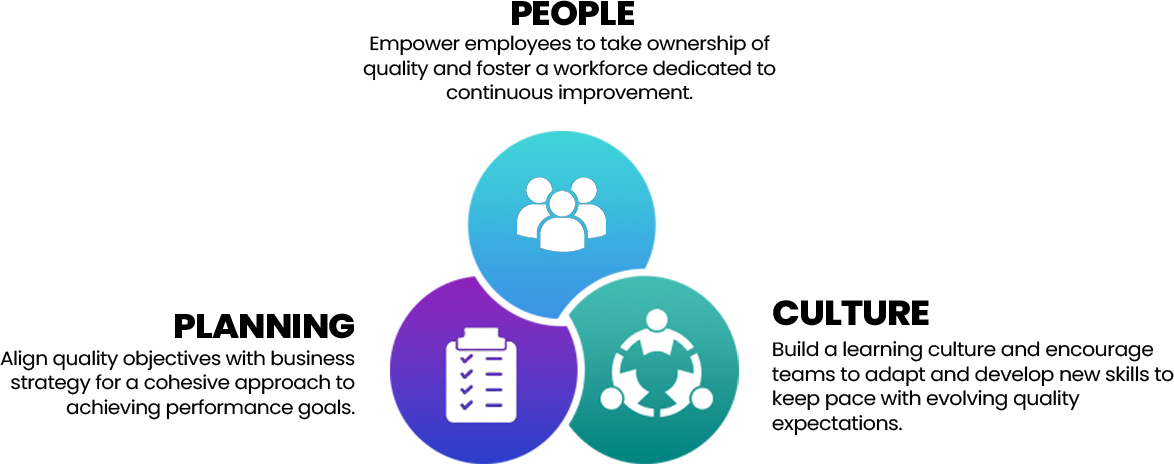In a rapidly evolving business landscape, organizations are under increasing pressure to deliver exceptional quality. While compliance ensures that products and services meet essential standards, it’s only the beginning. To truly thrive, businesses must view quality not as a checklist item but as a powerful driver of performance excellence. Going beyond compliance means harnessing quality to build customer loyalty, enhance efficiency, and drive sustainable growth.
Compliance as the foundation for quality assurance
Compliance ensures that companies adhere to specific standards and regulations, mitigating risks and maintaining a certain level of quality. However, relying solely on compliance can limit growth potential. Compliance addresses the minimum standards. But in a competitive market, businesses risk missing out on opportunities to differentiate and innovate.
Those who view compliance as only the first step and aim to exceed these standards are better positioned to achieve lasting success. Moving beyond compliance empowers organizations to evolve with changing market demands, strengthening resilience and reputation over time.
A performance-driven approach
To maximize the long-term value of quality assurance and achieve true performance excellence, organizations must adopt a proactive and strategic approach. Here are some key strategies to consider:

Customer-centric quality
Quality excellence begins with the customer. Actively seeking and responding to customer feedback is essential for creating products and services that exceed expectations. By incorporating feedback into continuous improvement efforts, companies can boost customer satisfaction and loyalty.

Innovation and differentiation
Leading companies are proactive about quality, setting new benchmarks in their industries. By focusing on continuous improvement and staying ahead of trends, organizations can differentiate themselves through superior products and services.

Leveraging technology for
quality insights
Real-time data analytics, process automation, and quality monitoring systems help businesses identify quality issues early and optimize processes, reducing waste and improving efficiency. Over the long term, these improvements build a more agile, resilient operation that can respond swiftly to market changes.

Sustainability, inclusivity, and
social responsibility
Integrating ethical, environmental, and inclusive practices into quality processes demonstrates a commitment to social responsibility. Companies that prioritize sustainability, embrace diversity, and foster inclusivity strengthen connections with customers and stakeholders who value ethical business practices.
The long-term impact of quality assurance
- Improved brand reputation: Consistent quality leads to increased customer satisfaction and loyalty, strengthening brand reputation.
- Increased market share: Superior quality products and services attract more customers and drive market share growth.
- Improved financial performance: Reduced defects, lower rework costs, and higher customer retention contribute to improved profitability.
- Greater efficiency and productivity: Streamlined processes and optimized workflows enhance operational efficiency.
- Risk mitigation: Proactive quality assurance helps identify and address potential risks before they escalate.
Driving quality excellence starts with leadership
Leadership is pivotal in setting the tone for quality excellence. By fostering a culture that promotes quality and provides resources to support it, leaders create a foundation for sustained organizational success.
- Communicating a vision of excellence: Leaders inspire a commitment to quality by articulating its role in long-term business success. When everyone in the organization understands how quality contributes to sustained performance, they’re more likely to support and prioritize quality assurance initiatives.
- Allocating resources for success: Quality excellence requires investment in tools, training, and systems. Leaders who provide these resources enable teams to maintain high performance, ensuring quality assurance initiatives continue to deliver value as the organization grows.
- Celebrating quality achievements: Recognizing quality milestones and celebrating achievements reinforces the organization’s dedication to excellence. Over time, these acknowledgments create a positive culture that supports long-term quality goals, reinforcing the importance of quality as a driver of organizational success.
Quality assurance is a shared responsibility
Quality is not solely the responsibility of the quality assurance department. It’s a collective effort that requires the involvement and commitment of every employee. Making quality a shared responsibility creates a culture where everyone contributes to excellence.


Building a legacy of excellence with quality assurance
Quality assurance is a long-term commitment that goes beyond compliance, turning it into the cornerstone of business resilience and growth. Businesses that balance compliance with performance are better positioned to meet changing market demands, deliver greater customer value, and achieve sustained success. By making quality a shared priority and investing in strategies that support high performance, businesses can leverage quality as a strategic asset that drives competitive advantage and long-lasting impact.
Ready to supercharge your quality assurance practices for lasting success? Consult with #StratpointQA experts and download our comprehensive QA playbook.




